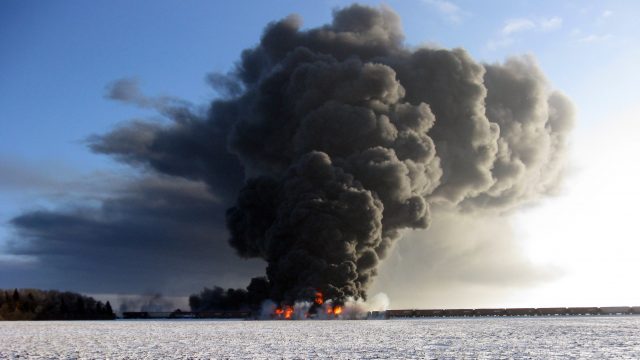NTSB Report Implicates Oil Cars In Casselton Derailment

The initial report from the National Transportation Safety Board is out regarding the explosive train derailment near Casselton. The full report is below, but here are a few facts:
- The derailment spilled roughly 400,000 gallons of oil. That’s about 12,698 barrels which is a little more than half the size of the Tesoro oil pipeline leak near Tioga last year.
- Of the rail cars that derailed, 20 were oil cars and one was a car carrying sand.
- Of the 20 oil cars that derailed, 18 of them leaked fueling the massive explosions.
- The derailment happened when the oil train ran into a grain car from a separate train that had previously derailed on a different track. That train saw 13 of its cars in the middle derail (the train had 112 cars total).
- The crew on the oil train was late responding to didn’t apply the brakes until a few seconds before the accident happened.
- The speed of both trains was just over 40mph. The legal speed limit for trains in that area is 60mph, so they were well below the limit.
Based on these preliminary findings, it seems the biggest issue was the oil cars. It seems unlikely that the derailment would have become a national story, and the subject of much political debate, absent the leaking oil cars and the resulting explosions.
The Association of American Railroads has already agreed to tougher standards for oil rail cars, and the new rail cars being produced meet those standards. But as CBC News reports, “there are roughly 228,000 DOT-111 rail cars currently in operation across the United States.”
The spike in oil train traffic driven by Bakken oil production (among production in other regions of the country) has meant a sharp increase in demand for rail cars. Production of new cars hasn’t necessarily been able to keep up, making it hard to transition older cars out of service.
These recent derailments, and the media scrutiny they’ve received, will no doubt go a long way toward hastening that transition.
There is political pressure, too. “It’s very clear that we need tank cars with improved safety features for the transportation of Bakken crude oil,” North Dakota Governor Jack Dalrymple said in a press release today after a conversation with BNSF Railway Chairman and CEO Matt Rose. “We support new, more stringent safety standards for tank cars, but we also need to address operational practices. The discussion about operating rules needs to include train speeds.”
Those statements make sense. Certainly a lot more sense than calls to slow oil production down with more regulation.




